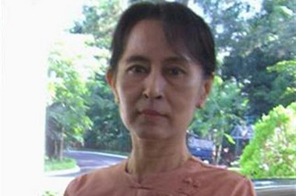World rounds on Myanmar
BRUSSELS: The world rounded Tuesday on Myanmar after Aung San Suu Kyi's house arrest was extended, with the European Union pledging new sanctions and the UN Security Council calling an emergency meeting.
After the authorities ordered the Nobel peace prize winner and democracy icon to remain under house arrest for a further 18 months, 14 other laureates wrote an open letter to the Security Council denouncing the outcome.
The Council was to hold consultations at 3:00 pm (1900 GMT) to take up the Myanmar court's verdict, according to a statement from Britain's United Nations Ambassador John Sawers, who chairs the 15-member body this month.
Earlier, UN Secretary General Ban Ki-moon said he was "deeply disappointed" by the decision, which came at the end of a marathon trial. Suu Kyi had stood accused of breaching the terms of her detention after an American man swam uninvited to her home.
Ban called on Myanmar's ruling generals "to immediately and unconditionally release Daw Aung San Suu Kyi and to engage with her without delay as an essential partner in the process of national dialogue and reconciliation."
The sentence, which effectively ruled out any possibility of the 64-year-old standing in polls next year, provoked immediate calls for tougher sanctions against the military rulers who prevented Suu Kyi from taking power after her party won elections in 1990.
"The EU will respond with additional targeted measures against those responsible for the verdict," the European Union's Swedish presidency said in a statement on behalf of the 27-nation bloc.
European Commission President Jose Manuel Barroso said Suu Kyi's continued detention was "unjustified and unacceptable on all accounts".
An EU source said a "written procedure" had been launched to beef up the sanctions which could come into force on Friday if there was no opposition from the bloc's members.
Former Czech President Vaclav Havel, who was imprisoned during the communist era, charged the house arrest extension was "scandalous" and reflected the "political cynicism of one of the toughest totalitarian regimes in the world".
Suu Kyi, US Secretary of State Hillary Clinton said, "should not have been tried and she should not have been convicted".
Gordon Brown, prime minister of Myanmar's former colonial power Britain, said he was "saddened and angry" at the verdict in the "sham trial".
"This is a purely political sentence designed to prevent her from taking part in the regime's planned elections next year," he charged.
Criticism was more muted closer to home but Malaysia's foreign minister said Suu Kyi should be released immediately and called for an urgent meeting of the Association of Southeast Asian Nations (ASEAN) regional bloc.
"We were hoping that the junta will release her unconditionally and will hold an election to enable Suu Kyi and other political detainees to participate in that election," Anifah Aman told AFP.
Philippine Foreign Secretary Alberto Romulo concurred, telling reporters: "They don't want her to be out before the election."
And a third ASEAN member, Indonesia, said it was "very disappointed" by the verdict, in a statement from a foreign ministry spokesman.
Myanmar's giant neighbour India refrained from denouncing the outcome, but foreign ministry spokesman Vishnu Prakash said New Delhi "has emphasised to the government of Myanmar the need to expedite the political reform and national reconciliation process."
Prakash called for a "broadbased" process that includes various ethnic groups and said that in this context, "the issue of the release of political prisoners will no doubt receive due attention."
But there was no reaction out of Myanmar's two other powerful regional neighbors, China and Thailand, which have, along with India, been accused in the past of helping to prop up the junta in Yangon.
Irene Khan, secretary general of London-based Amnesty International, described the verdict as "shameful" and "nothing more than legal and political theatre."
New York-based Human Rights Watch called the conviction a "reprehensible abuse of power" and urged regional allies to press for her release.






